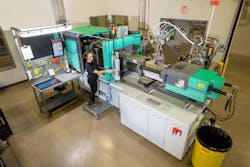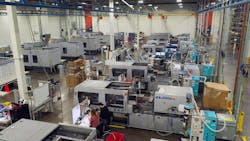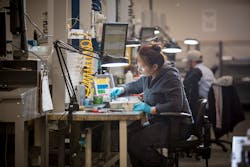IW Best Plants Winner: Pushing the Limits of Prototyping Speed at Protolabs Injection Molding Facility
There’s no getting around it: Protolabs’ Injection Molding Facility in Plymouth, Minnesota, stands out as an unusual IW Best Plants winner. Most winners make one product or a small handful of products, and they aim to maximize the amount of time their machines are running.
Unlike most winners and most factories, though, Protolabs produces unique custom products, quickly and on demand. The Plymouth plant makes (appropriately for the name) prototypes. The products that make up its high-mix, low-volume output are modeled by a computer and made into injection-molded plastic pieces within a timespan of mere days or hours. Protolabs Plymouth’s remarkable achievements in perfecting its model of manufacturing—and working to advance beyond it—are what make it a worthy 2022 IndustryWeek Best Plants Winner.
Gurvinder Singh, global product director of Protolabs’ injection molding operations, says the reason Protolabs exists comes down to one word—speed. This single-factor focus is one reason for the company’s unorthodox approach to machine availability: Part of Protolabs’ appeal for clients, according to Plymouth plant leadership, is what the company calls its “infinite capacity” model, in which machine uptime is treated as a capacity performance indicator instead of a performance capacity indicator.
In short, since the company has so much capacity, its clients never have to reserve production time. Plymouth’s quick turnaround also explains why the company holds relatively little inventory.
Plymouth’s devotion to speed and ease of client access has led to remarkable agility for its operation. According to Greg Wesling, director of manufacturing operations, the turnaround on some projects from 3D-modeled plan to mold to a prototype in the client’s hand can be as little as 24 hours—though the standard is more often closer to 10 days.
The speed and simplicity of the process is reminiscent of “gig” apps like Lyft or Uber Eats in terms of its convenience and ease of use. First, a prospective client visits Protolabs’ website. They upload a 3D model of the part they want to create. Protolabs then uses software to analyze the model and evaluate how well it can be made using injection molding, making recommendations along the way. This design-for-manufacturing analysis, or DFM, plan is then usually checked over by one of the company engineers, many of whom now work remotely.
To hear more from Raymond and other IW Best Plants winners, attend the Manufacturing & Technology Show from Oct. 18-20 in Cleveland. All four winner's of this year's awards will participate in a panel discussion on Oct. 19 to discuss how they approach continuous improvement and strive toward manufacturing excellence.
Once the design is finalized, the front end can send the plans directly to the milling machines, which machine aluminum blocks into custom molds. At the same time, it can also send those parts to Plymouth’s quality control area, where automated 3D printers produce fittings to hold the finished, molded part in place for quality checking by a computerized coordinate-measuring machine, letting the company run inspections on the parts made without adding lead time.
The end-to-end digital chain of Protolabs Plymouth’s process, Singh says, is one of the company’s competitive advantages over operations that prioritize front-end tech. Each part can be digitally tracked through the process of the plant by the client that ordered it.
“Websites are common now, right?” Singh points out. “Our level of automation is high on the front end, but I think on the front end, everybody’s figuring out how to do it. I think we still are significantly different from any other competitor on the back end.”
Protolabs’ other advantage over its competitors, Singh says, is its manufacturing expertise. While some prototyping companies are essentially intermediaries that connect clients to other contract manufacturers, Protolabs Plymouth has the know-how to do its own stunts. At the same time, though, the company is planning to expand its footprint on what it can provide for customers beyond its own house-made prototypes: Protolabs’ acquisition of 3D Hubs last year, Singh says, will cover even more ground by enabling Protolabs to connect clients to other manufacturers for high-scale orders.
“[The Hubs acquisition] basically allows us to be the one-stop shop. You want early prototyping and you want fast, we’re here for you. Hey, if you want longer lead times, we’re here for you,” Singh said. “You want millions of parts, which we’re not great for? We will help you fulfill it from a plant.”
Like other IW Best Plants winners this year and in the past, Protolabs credits its employees’ freedom to make decisions for part of its success through kaizen projects and getting floor employees invested.
“We are extremely fortunate. We have got a very committed and very engaged workforce,” Wesling says. Plymouth employees feel connected to the success of the plant, he says, thanks in part to clearly indicated plant KPIs displayed on whiteboards, as well as individual goals and annual merit pay increases.
As for attracting newer workers, Plymouth appeals in large part because of its impressive investments in technology and the digital chain. “If you look at Protolabs and what it does, it’s a technology company, right?” says Singh. “We’re all powered by technology; we talk in technology.”
Vigorous devotion to speed and quality, a strong focus on customer satisfaction tied with a culture that encourages employees to experiment, and innovative technology: These are the features that qualify Protolabs Plymouth as an IW Best Plant.
Protolabs Injection Molding Facility
- Plymouth, Minnesota
- Employees: 450
- Square Footage, Manufacturing: 140,000
- Primary Products: Injection molding
- Start-up date: 2014
Achievements: Automated digital twin, Recognition as a WEF Global Lighthouse Network plant, 16.4% reduction in scrap and rework costs within past 3 years, digital process control reduced parts non-conformance by 45%, increased large injection molding capacity by more than 50% in the past 3 years.
About the Author
Ryan Secard
Associate Editor
Ryan Secard joined Endeavor B2B in 2020 as a news editor for IndustryWeek. He currently contributes to IW, American Machinist, Foundry Management & Technology, and Plant Services on breaking manufacturing news, new products, plant openings and closures, and labor issues in manufacturing.


